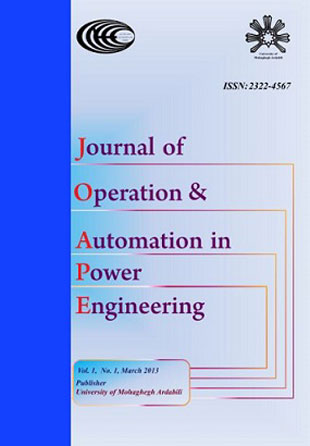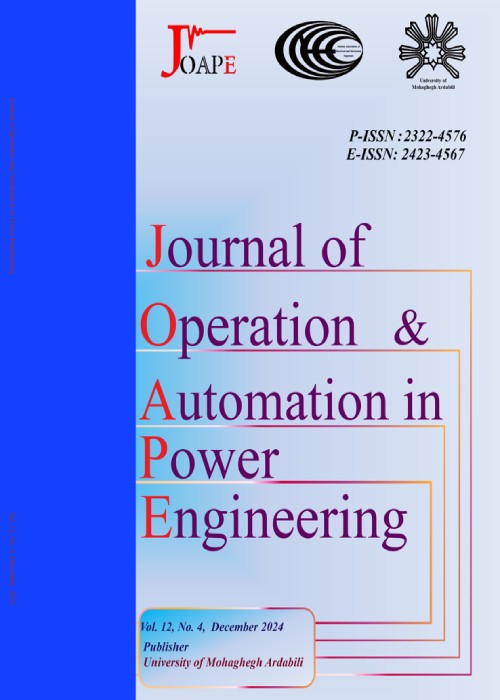فهرست مطالب

Journal of Operation and Automation in Power Engineering
Volume:1 Issue: 1, Winter - Spring 2013
- تاریخ انتشار: 1392/03/28
- تعداد عناوین: 7
-
-
Page 1In this paper, a combinational optimization algorithm is introduced to obtain the best size and location of Static Compensator (STATCOM) in power systems. Its main contribution is considering contingency analysis where lines outages may lead to infeasible solutions especially at peak loads and it commonly can be vanished by load-shedding. The objective of the proposed algorithm is firstly to prevent infeasible power flow solutions without undesired load-shedding, which is critical in contingency analysis; and secondly to mitigate overall power losses and costs. Moreover, active and reactive powers generation costs are considered in the proposed objective function. Since there are various constraints such as lines outages number, cost and their duration that must be taken to account, Bacterial Foraging oriented by Particle Swarm Optimization (BF-PSO) algorithm combined with Optimal Power Flow (OPF) is used to solve and overcome the complexity of this combinational nonlinear problem. In order to validate the accuracy of the proposed method, two test systems, including IEEE 30 bus standard system and Azarbaijan regional power system of Iran, are applied in simulation studies. All obtained optimization results show the effectiveness of the suggested combinational method in loss and cost reduction and preventing load-shedding.
-
Page 12In this paper, a Non-dominated Sorting Genetic Algorithm-II (NSGA-II) based approach is presented for distribution system reconfiguration. In contrast to the conventional GA based methods, the proposed approach does not require weighting factors for conversion of multi-objective function into an equivalent single objective function. In order to illustrate the performance of the proposed method, 33-bus and 69-bus distribution networks have been employed which have led to the desired results.
-
Page 22In this paper, the Unified Power Flow Controller (UPFC) is enhanced with a Chaotic Particle Swarm Optimization (CPSO) Damping Controller in order to mitigate the Low Frequency Oscillations (LFO) in a Single Machine Infinite Bus (SMIB) power system. The designed damping controller is an optimized lead-lag controller, which extracts the speed deviation of the generator rotor and generates the output feedback signal, which aims to modulate the reference values of the UPFC normal controller to achieve the best damping of LFO. In order to examine the better damping option, the damping controller is applied to both series and shunt converter of the UPFC and the results are comprehensively compared in three different operating points. Simulation results are performed in MATLAB/Simulink in three different cases and a Performance Index (PI) analysis is carried out.
-
Page 32This paper focuses on multi-objective designing of multi-machine Thyristor Controlled Series Compensator (TCSC) using Strength Pareto Evolutionary Algorithm (SPEA). The TCSC parameters designing problem is converted to an optimization problem with the multi-objective function including the desired damping factor and the desired damping ratio of the power system modes, which is solved by a SPEA algorithm. The effectiveness of the proposed controller validates on a multi-machine power system over a wide range of loading conditions. The results of the proposed controller (SPEATCSC) are compared with the Genetic Algorithm (GA) based tuned TCSC through some operating conditions to demonstrate its superior efficiency.
-
Page 43This paper presents a novel indirect adaptive Power System Stabilizer (PSS) via a developed synergetic control methodology and fuzzy systems. Fuzzy system is utilized in an adaptive scheme to estimate the system using a nonlinear model. The synergetic control guarantees robustness of the controller and makes the controller easy to implement because of using a chatter free continuous control law. Additionally, the parameters of the controller are optimized by Imperialist Competitive Algorithm (ICA). The effectiveness of the proposed scheme is confirmed on a single machine power system while the stability is guaranteed through Lyapunov synthesis.
-
Page 54This paper presents an innovative active power filter design method to simultaneously compensate the current harmonics and reactive power of a nonlinear load. The power filter integrates a passive power filter which is a RL low-pass filter placed in series with the load, and an active power filter which comprises an RL in series with an IGBT based voltage source converter. The filter is assumed to inject a current into the connection node of the load and grid to eliminate current harmonics and its reactive part. The voltage source converter is placed in a hysteresis feedback control loop to generate a harmonic current. The bandwidth and output amplitude of the hysteresis controller are optimized with the inductance of RL filters. Three objective functions are considered in the optimization problem, which include minimizing of current total harmonic distortion, maximizing of power factor, and minimizing of the IGBT bridge current. For solving the optimization problem, two well-known multi-objective evolutionary algorithms are applied, namely, non-dominated sorting genetic algorithm-II (NSGA-II) and Strength Pareto Evolutionary Algorithm 2 (SPEA2). Test results showed that the SPEA2 technique exhibited a better performance in comparison to NSGA-II relative to the objectives.
-
Page 63A new Multi-Stage Fuzzy (MSF) controller based on Multi-objective Harmony Search Algorithm (MOHSA) is proposed in this paper to solve the Load Frequency Control (LFC) problem of power systems in deregulated environment. LFC problem are caused by load perturbations, which continuously disturb the normal operation of power system. The objectives of LFC are to mini small size the transient deviations in these variables (area frequency and tie-line power interchange) and to ensure their steady state errors to be zero. In the proposed controller, the signal is tuned online using the knowledge base and fuzzy inference. Also, to reduce the design effort and optimize the fuzzy control system, membership functions are designed automatically by the proposed MOHSA method. Obtained results from the proposed controller are compared with the results of several other LFC controllers. These comparisons demonstrate the superiority and robustness of the proposed strategy.


